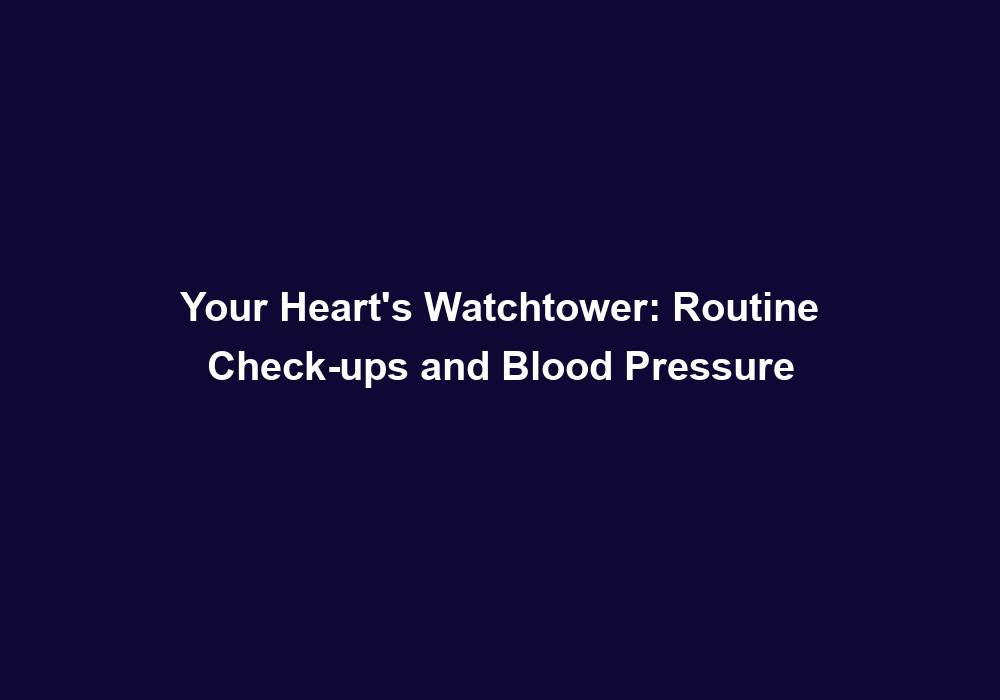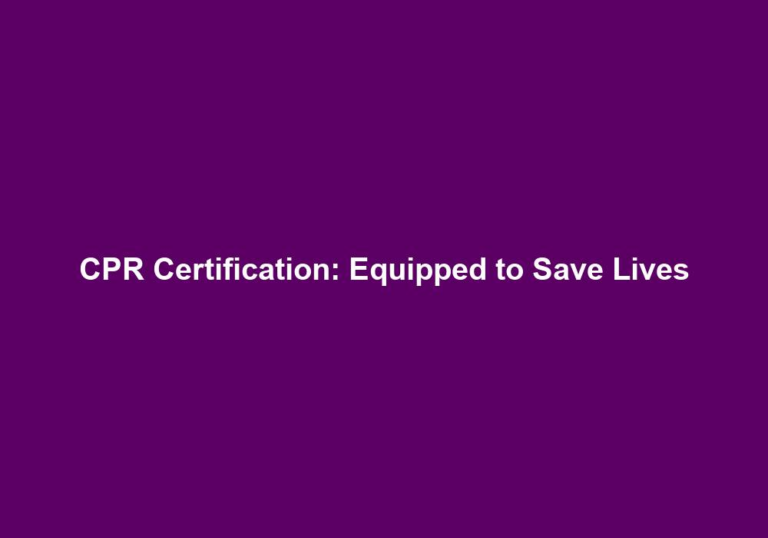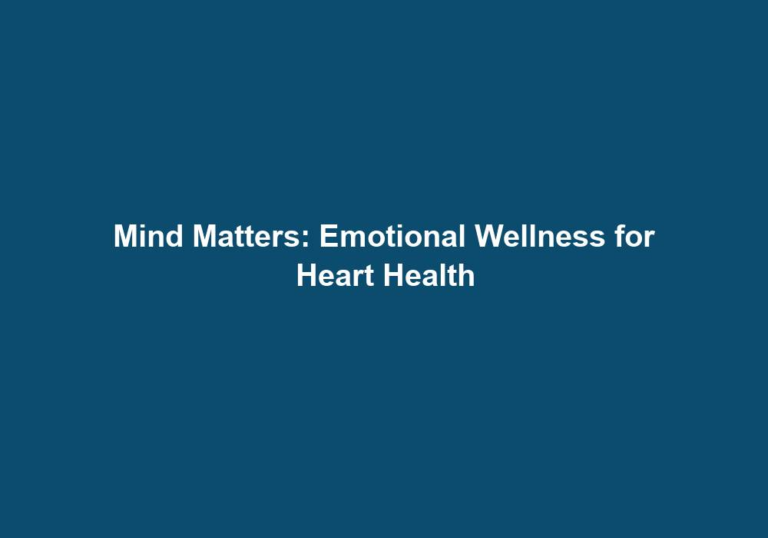Your Heart’s Watchtower: Routine Check-ups and Blood Pressure
Regular check-ups and monitoring your blood pressure are crucial steps in maintaining a healthy heart. By prioritizing these routine examinations, you can detect any potential issues early on and take necessary actions to prevent more serious conditions. In this article, we will delve into the importance of routine check-ups and the significance of keeping your blood pressure in check.
The Importance of Routine Check-ups
Routine check-ups serve as a vital aspect of preventive healthcare. By visiting your healthcare provider regularly, you ensure that any potential health concerns are identified before they escalate into more serious problems. These check-ups typically involve a comprehensive evaluation of your overall health, which includes monitoring your blood pressure levels.
Detecting Hidden Health Issues
During routine check-ups, your healthcare provider will conduct various assessments to evaluate your overall health status. These assessments may include measuring your blood pressure, cholesterol levels, blood sugar levels, and body mass index (BMI). Through these measurements, your healthcare provider can identify any hidden health issues that may be developing.
By detecting these issues early on, prompt intervention can be initiated to prevent the progression of conditions such as hypertension, diabetes, or high cholesterol. This early detection can save you from potential long-term health complications and improve your quality of life.
Establishing Baseline Measurements
Routine check-ups also help establish baseline measurements for your health. By regularly monitoring your blood pressure, your healthcare provider can identify any fluctuations or abnormalities. This allows them to establish a baseline for your blood pressure readings, which can be used as a reference for future measurements.
Having a baseline measurement enables your healthcare provider to recognize any significant changes in your blood pressure, indicating potential health issues. By comparing the current readings with the established baseline, they can determine if further investigation or intervention is necessary.
Building a Strong Doctor-Patient Relationship
Regular check-ups foster a strong and trusting relationship between you and your healthcare provider. By consistently visiting your provider, you can develop open communication and discuss any concerns or questions you may have regarding your health.
This relationship enables your healthcare provider to understand your medical history, lifestyle, and any risk factors that may contribute to heart-related problems. By having a comprehensive understanding of your health, they can tailor their recommendations and advice to suit your specific needs.
The Significance of Blood Pressure Monitoring
Blood pressure monitoring is a fundamental component of routine check-ups, especially when it comes to heart health. Let’s explore why keeping your blood pressure in check is essential.
Understanding Blood Pressure
Blood pressure refers to the force exerted by the blood against the walls of your arteries as it circulates throughout your body. It is measured in millimeters of mercury (mmHg) and presented as two numbers: systolic pressure over diastolic pressure.
The systolic pressure represents the force exerted on the arterial walls when your heart contracts, while diastolic pressure indicates the force when your heart is at rest between beats. A typical blood pressure reading is expressed as systolic/diastolic, such as 120/80 mmHg.
Maintaining Optimal Blood Pressure
Maintaining optimal blood pressure is vital for a healthy heart and overall well-being. High blood pressure, also known as hypertension, puts strain on your arteries and heart. Over time, this strain can lead to serious health conditions such as heart disease, stroke, or kidney problems.
On the other hand, low blood pressure, or hypotension, can cause dizziness, fainting, and insufficient blood flow to vital organs. Therefore, it is crucial to keep your blood pressure within the normal range to promote a healthy cardiovascular system.
Regular Blood Pressure Checks
Regular blood pressure checks help you stay aware of your blood pressure levels and detect any abnormalities. These checks can be done at your healthcare provider’s office, at home using a home blood pressure monitor, or by utilizing automated blood pressure machines available at pharmacies.
Your healthcare provider will guide you on how often you should check your blood pressure based on your individual health profile. Generally, it is recommended to have your blood pressure checked at least once every two years if your readings are consistently within the normal range. However, if you have a history of high blood pressure or other risk factors, more frequent monitoring may be necessary.
Lifestyle Modifications for Blood Pressure Management
Maintaining a healthy lifestyle plays a crucial role in managing your blood pressure. Here are some lifestyle modifications that can help keep your blood pressure in check:
- Eating a Balanced Diet: A diet rich in fruits, vegetables, whole grains, lean proteins, and low-fat dairy products can help lower blood pressure. Incorporate foods that are high in potassium, such as bananas, oranges, spinach, and sweet potatoes, as potassium helps to counterbalance the effects of sodium.
- Reducing Sodium Intake: Limiting your sodium consumption to less than 2,300 milligrams per day (or even less if advised by your healthcare provider) can help manage blood pressure. Be mindful of processed and packaged foods, as they often contain high levels of sodium.
- Engaging in Regular Physical Activity: Aim for at least 150 minutes of moderate-intensity aerobic activity or 75 minutes of vigorous-intensity aerobic activity every week to maintain a healthy blood pressure. Exercise helps strengthen your heart and blood vessels, improving their efficiency.
- Maintaining a Healthy Weight: Losing excess weight can significantly contribute to managing blood pressure levels. If you are overweight or obese, even a modest weight loss of 5-10% can make a noticeable difference in your blood pressure.
- Limiting Alcohol Consumption: Excessive alcohol intake can raise blood pressure, so it is advisable to consume alcohol in moderation or avoid it altogether. For men, moderation means up to two standard drinks per day, while for women, it is one standard drink per day.
- Managing Stress: Implement stress management techniques such as meditation, deep breathing exercises, or engaging in hobbies to help keep your blood pressure under control. Chronic stress can contribute to high blood pressure, so finding healthy coping mechanisms is essential.
In conclusion, routine check-ups and blood pressure monitoring are essential for maintaining a healthy heart. These practices help detect hidden health issues, establish baseline measurements, and foster a strong doctor-patient relationship. Monitoring your blood pressure regularly allows for early detection of abnormalities, helping prevent serious heart conditions. By making necessary lifestyle modifications and working closely with your healthcare provider, you can take control of your heart health and enjoy a long and fulfilling life.







